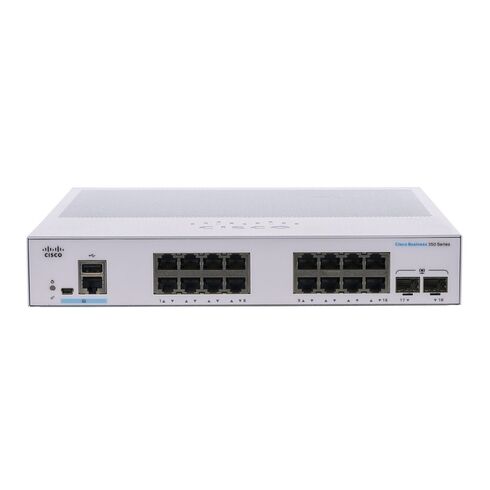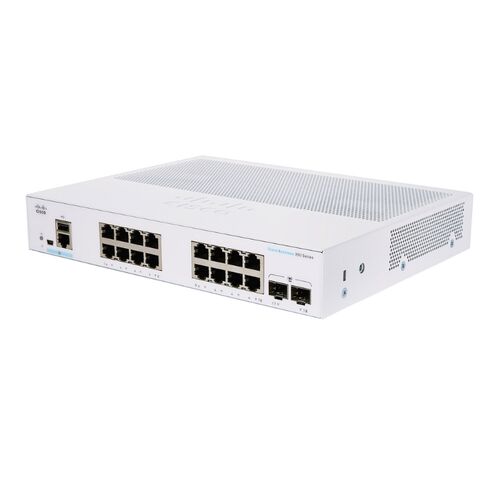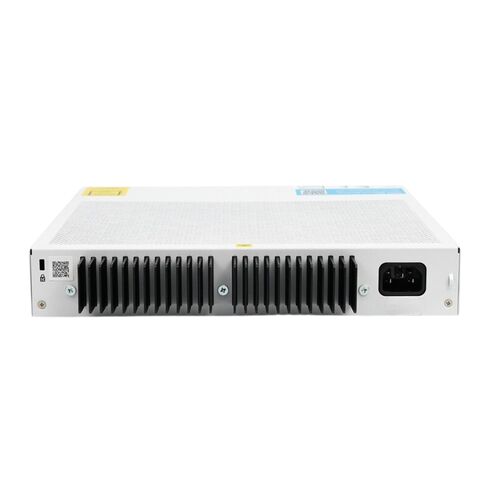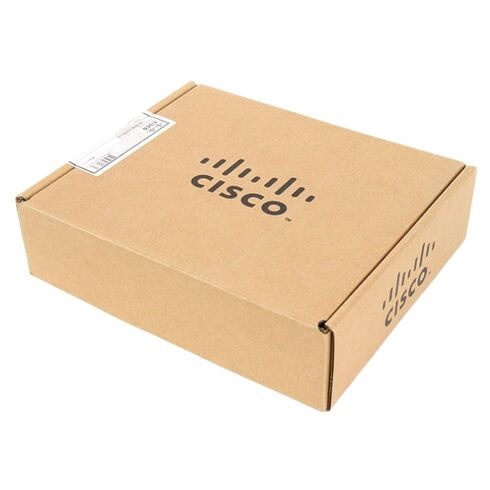CBS350-16P-E-2G-NA Cisco Switch 18 Ports Ethernet 3 Layer Manageable
- — Free Ground Shipping
- — Min. 6-month Replacement Warranty
- — Genuine/Authentic Products
- — Easy Return and Exchange
- — Different Payment Methods
- — Best Price
- — We Guarantee Price Matching
- — Tax-Exempt Facilities
- — 24/7 Live Chat, Phone Support
- — Visa, MasterCard, Discover, and Amex
- — JCB, Diners Club, UnionPay
- — PayPal, ACH/Bank Transfer (11% Off)
- — Apple Pay, Amazon Pay, Google Pay
- — Buy Now, Pay Later - Affirm, Afterpay
- — GOV/EDU/Institutions PO's Accepted
- — Invoices
- — Deliver Anywhere
- — Express Delivery in the USA and Worldwide
- — Ship to -APO -FPO
- — For USA - Free Ground Shipping
- — Worldwide - from $30
Same product also available in:
| SKU/MPN | Warranty | Price | Condition | You save |
|---|---|---|---|---|
| CBS350-16P-E-2G-NA | 1 Year Warranty | $625.00 | Factory-Sealed New Retail in Original Box (FSB) | You save: $218.75 (26%) |
| CBS350-16P-E-2G-NA | 1 Year Warranty | $305.00 | Excellent Refurbished | You save: $106.75 (26%) |
Cisco Managed Ethernet Switching for Business Networks
The Cisco CBS350-16P-E-2G-NA is a fully manageable Ethernet switch designed to support growing business infrastructures that require reliable connectivity, enhanced control, and scalable performance. As part of the Cisco 350 Ethernet Switch series, this device delivers advanced Layer 3 capabilities, making it suitable for enterprise branches, SMB environments, and structured network deployments.
Product Identity and Classification
- Brand: Cisco
- Model Number: CBS350-16P-E-2G-NA
- Series: Cisco Business 350 Series
- Category: Managed Ethernet Network Switch
Enhanced Traffic Management Features
- Inter-VLAN routing support
- Optimized data packet forwarding
- Improved bandwidth utilization
- Reduced latency across network segments
Network Interface Highlights
- Total Ports: 16 Ethernet interfaces
- Uplink Support: Enabled for extended network reach
- Consistent Throughput: Designed for stable data transfer
Design Advantages
- Modular architecture for adaptability
- Optimized airflow and hardware layout
- Suitable for rack or structured installations
Recommended Environments
- Small to medium-sized business networks
- Enterprise branch offices
- Educational and institutional infrastructures
- Professional IT and managed service deployments
Cisco CBS350-16P-E-2G-NA Managed Ethernet Switching
The Cisco CBS350-16P-E-2G-NA belongs to the Cisco Business 350 Series, a family of fully managed Ethernet switches engineered to support small and medium-sized enterprises that require advanced Layer 3 networking capabilities without enterprise-level complexity. This category of switches is designed to deliver consistent performance, enhanced security, and simplified network control while maintaining flexibility for expansion. As part of the managed switch segment, the CBS350 series emphasizes intelligent traffic handling, robust power delivery, and comprehensive management features that align with modern digital workloads.
Within this category, the focus is on providing reliable connectivity across wired infrastructures that support IP telephony, wireless access points, surveillance systems, and bandwidth-intensive applications. The Cisco CBS350-16P-E-2G-NA reflects the broader goals of this class by offering Power over Ethernet functionality, Layer 3 routing features, and multiple uplink options, making it a strategic choice for organizations that want centralized control over their local area networks.
Layer 3 Capabilities in Business-Class Switching
The managed Layer 3 switch category addresses the need for inter-VLAN routing and advanced traffic segmentation within a single device. In environments where multiple departments, services, or user groups coexist, Layer 3 switching enables efficient data flow between VLANs without relying heavily on external routers. This category supports static routing and dynamic routing enhancements that reduce latency and simplify network architecture.
Cisco Business 350 Series switches are positioned to deliver Layer 3 functionality that balances performance and simplicity. This allows IT administrators to design scalable networks that can adapt to changing business requirements. The CBS350-16P-E-2G-NA exemplifies how this category integrates routing intelligence directly into the switching fabric, ensuring optimized data paths and improved application responsiveness.
Inter-VLAN Routing and Network Segmentation
Network segmentation is a defining feature of managed Layer 3 switches. This category enables administrators to isolate traffic for security, performance, and compliance reasons. By supporting multiple VLANs and routing between them at wire speed, Cisco Business switches help reduce broadcast traffic while maintaining seamless communication across departments.
The ability to configure static routes within the switch allows organizations to manage internal traffic locally, minimizing dependency on external routing devices. This design approach enhances network resilience and simplifies troubleshooting, which is a core benefit of the Cisco CBS350 managed switch category.
Support for Modern IP-Based Services
Managed switches in this segment are optimized for IP-based services such as Voice over IP, video conferencing, and cloud-based applications. Quality of Service mechanisms prioritize critical traffic, ensuring that latency-sensitive applications perform reliably even during peak usage. This category is built to accommodate converged networks where data, voice, and video share the same infrastructure.
The Cisco Business 350 Series aligns with these requirements by incorporating intelligent traffic classification and prioritization, making the category suitable for organizations that depend on real-time communications and collaborative tools.
Power over Ethernet Switching Category
Power over Ethernet is a defining attribute of many modern managed switches, and this category emphasizes the ability to deliver both data and electrical power through standard Ethernet cabling. PoE-capable switches simplify network deployments by eliminating the need for separate power sources for connected devices. This is particularly beneficial in environments deploying IP phones, wireless access points, and security cameras.
The Cisco CBS350-16P-E-2G-NA represents a PoE-enabled segment within the Business 350 Series, designed to support reliable power delivery while maintaining efficient energy usage. This category focuses on providing sufficient power budgets, intelligent power allocation, and protection mechanisms to ensure connected devices operate safely and consistently.
Efficient Power Distribution for Network Devices
PoE-managed switches in this category are engineered to allocate power dynamically based on device requirements. This ensures that critical devices receive priority while optimizing overall energy consumption. Intelligent power management reduces operational costs and supports sustainability goals without compromising performance.
Cisco Business switches incorporate advanced PoE features that allow administrators to monitor and control power usage at the port level. This capability is central to the category’s value proposition, offering visibility and control over powered network endpoints.
Scalability for Expanding Deployments
As organizations grow, their network infrastructure must scale accordingly. The PoE switch category addresses this need by supporting additional powered devices without requiring major redesigns. The CBS350 series is positioned to handle increasing numbers of endpoints, making it suitable for evolving business environments.
This scalability ensures that investments in managed PoE switches remain relevant over time, providing long-term value and adaptability.
Advanced Security Features in Managed Switches
Security is a critical consideration in the managed Ethernet switch category. Modern networks face constant threats from unauthorized access, malware, and internal vulnerabilities. Cisco Business 350 Series switches are designed to address these challenges by incorporating a comprehensive set of security features that protect network integrity.
This category emphasizes proactive defense mechanisms, including access control, traffic filtering, and network monitoring. The CBS350-16P-E-2G-NA aligns with these principles by offering enterprise-grade security capabilities tailored for business environments.
Access Control and Authentication Mechanisms
Managed switches in this category support multiple authentication methods to ensure that only authorized users and devices gain network access. Features such as port-based authentication and role-based access control enable administrators to enforce security policies consistently across the infrastructure.
These mechanisms reduce the risk of unauthorized access while maintaining flexibility for legitimate users. Cisco Business switches integrate these features seamlessly, making them accessible even to organizations with limited IT resources.
Network Management and Configuration Flexibility
Ease of management is a defining characteristic of the Cisco Business managed switch category. These switches are designed to simplify configuration, monitoring, and maintenance tasks while providing the depth of control required for complex networks. Centralized management interfaces and intuitive tools reduce administrative overhead.
The CBS350-16P-E-2G-NA fits within a category that prioritizes operational efficiency. Administrators can manage network settings, monitor performance, and apply updates without extensive downtime or specialized expertise.
Web-Based and Centralized Management Options
Managed switches in this segment often feature user-friendly web-based interfaces that streamline configuration tasks. This approach allows IT teams to manage network settings visually, reducing the likelihood of errors and improving overall efficiency.
Cisco Business switches also support centralized management solutions that enable consistent policy enforcement across multiple devices. This capability is especially valuable for organizations with distributed network environments.
Automation and Configuration Consistency
Automation features within the managed switch category help ensure consistent configurations across the network. By reducing manual intervention, these capabilities minimize configuration drift and enhance network stability.
The Cisco Business 350 Series supports these automation principles, allowing organizations to maintain reliable operations as their networks evolve.
Performance Optimization and Reliability
High performance and reliability are essential attributes of the managed Ethernet switch category. Cisco Business switches are engineered to deliver consistent throughput, low latency, and high availability, ensuring that critical applications remain accessible at all times.
The CBS350-16P-E-2G-NA is part of a category that emphasizes resilient design, incorporating features such as redundancy support and efficient traffic handling. These characteristics make the switches suitable for mission-critical business operations.
Optimized Traffic Handling
Managed switches in this category use advanced forwarding mechanisms to ensure efficient data transmission. Features such as intelligent buffering and traffic prioritization contribute to stable performance under varying load conditions.
This level of optimization supports demanding applications and ensures a consistent user experience across the network.
High Availability for Business Continuity
Network downtime can have significant operational impacts. The managed switch category addresses this risk by supporting high availability features that enhance resilience. These design considerations help maintain connectivity even in the event of component failures.
Cisco Business switches are designed with reliability in mind, providing peace of mind for organizations that depend on continuous network access.
Use Cases Across Business Environments
The Cisco CBS350-16P-E-2G-NA and its broader category are suitable for a wide range of business environments, including offices, retail locations, educational institutions, and hospitality venues. The combination of Layer 3 functionality, PoE support, and advanced management features enables versatile deployment scenarios.
This category supports organizations seeking to modernize their networks while maintaining cost efficiency and operational simplicity.
Supporting Digital Transformation Initiatives
As businesses adopt cloud services, collaboration tools, and smart technologies, their network infrastructure must adapt accordingly. Managed switches in this category provide the foundation for digital transformation by supporting scalable, secure, and high-performance connectivity.
The Cisco Business 350 Series aligns with these goals, making it a strategic component of modern IT infrastructures.
Long-Term Value and Investment Protection
Investing in managed Layer 3 switches within this category offers long-term benefits through scalability, feature-rich design, and reliable performance. Organizations can expand their networks and adopt new technologies without replacing core infrastructure.
The CBS350 series exemplifies this approach by delivering a balance of advanced capabilities and ease of use, ensuring sustained value over the lifecycle of the network.













